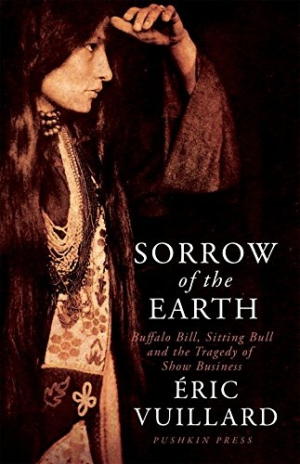
Sorrow of the Earth
Buffalo Bill, Sitting Bull and the Tragedy of Show Business
At the turn of the twentieth century, few Americans were more famous than Buffalo Bill Cody, and his Wild West shows played to huge crowds. But while those shows were popular, they also presented a sanitized and highly mythologized version of the West. In Sorrow of the Earth, Eric Vuillard uses musing prose to try to get inside the heads of Cody and of the Native Americans who performed in his shows, reenacting false versions of their experiences and creating an alternative history in the process.
This slim book is written with a mix of the show’s actual history and esoteric ruminations on how the participants must have felt about it. For Cody, Vuillard focuses on how the tall-tale exploits of his life became part of the show, and how late in life he claimed to have taken part in events he’d only recreated.
Vuillard also considers Sitting Bull, the great Lakota victor of the battle of Little Bighorn, who joined the Wild West Show to earn money by being paraded in front of booing crowds, signing autographs, and posing for pictures. He describes the plight of the survivors of the Wounded Knee Massacre, reliving the terrible events as part of the show, even as the context and inciting incidents were rewritten for an audience that supported removing Native Americans from their land.
The text is supplemented by photographs of the Wild West participants, from the famous shot of Cody and Sitting Bull together, to one of Lakota survivors sitting in a makeshift replica of their village. These help Vuillard show the peak and decline of a show that soon became an anachronism.
Cody formed his own town in Wyoming that fell into disrepair; Sitting Bull was murdered in a botched arrest; and other spectacles captured the public imagination. Vuillard describes all of this in a sad, poetic style that conveys how the show shaped ideas about the West long after the frontier was gone.
Reviewed by
Jeff Fleischer
Disclosure: This article is not an endorsement, but a review. The publisher of this book provided free copies of the book to have their book reviewed by a professional reviewer. No fee was paid by the publisher for this review. Foreword Reviews only recommends books that we love. Foreword Magazine, Inc. is disclosing this in accordance with the Federal Trade Commission’s 16 CFR, Part 255.
